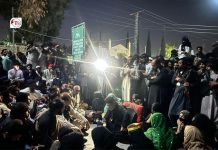Balochistan is one of the most resource rich regions in central Asia. Numerous minerals and metals, including Antimony, Copper, Gold, Iron, Lead – Zinc, Chromite, Manganese, Fluorite, Gypsum/anhydrite, Baryte, Limestone and Coal among many others, are found in large quantities in the region.
Just the Reko-Diq project, located in Chagai district of Balochistan, has more than 5 billion tonnes of Copper-Gold reserves, worth over $260 billion. The Iron reserves of just two deposits, Dilband and Chagai, amount to more than 335 million tonnes, there are six other similar deposits. The total proved, indicated, inferred and hypothetical resources of Coal amount to 217 million tonnes.
Similarly the estimated recoverable quantities of metals from Saindak Deposit totals 412 million tonnes. This includes 1.69 million tonnes of Copper, 2.24 million ounces of Gold and 2.49 million ounces of Silver, valuing $3380m, $867m and $12.45m respectively.
Along with abundance of wealthy resources it also has a very important geo-strategic location. It is a corridor that links the Far East, South Asia to Middle East and Central Asia.
Though very rich in resources it lays in abject poverty. It has worst social and economic conditions in the region. According to UNDP, 56% population of Balochistan is categorized ‘multi-dimensionally poor’ (United Nations Development Programme 2012). The illiteracy rate for females aged more than 10 years stands at alarming rate of 72.94% whereas nearly 48% of males of same age are also illiterate. 59.32% of girls and 52.72% of boys aged 5 to 10 years remain out of school. Out of 1000 children 89 die before they reach the age of 5. Alarmingly 785 out of 100,000 mothers die during pregnancy.
It is not that the resources in Balochistan remain untapped. Different multinational companies have been involved in extraction of mineral resources from different areas of Balochistan. This has resulted in creation of enormous revenues and profits for foreign corporations but the local population continues to live below the poverty line, though in midst of plenty.
One such company called Metallurgical Corporation of China (MCC), through its subsidiary MCC Resource Development Limited (MRDL), has been involved in extraction of copper and other minerals from Saindak project in Balochistan since 1997.
Metallurgical Corporation of China, a Chinese state-owned corporation, is a large conglomerate. It is listed on Shanghai and Hong Kong stock exchanges. The company has 51 principal wholly owned or non-wholly owned subsidiaries worldwide.
MCC is currently operating in various specialised fields in different countries of the world. Engineering and construction, equipment manufacturing, resources development, and property development are its principal businesses. The company claims that it has strong construction capabilities in metallurgical engineering.
Wenquing Guo was appointed as the Chairman of MCC in September 2013. Mr. Guo is also a member of Communist Party of China and has remained as Secretary of Communist Party Committee of different government and semi-government organisations in China. Therefore, MCC shares links with highly authoritative figures in Chinese government.
This project was awarded to MCC due to strong regional ties between states of Pakistan and China. However, this company has totally bypassed the welfare of population living near Saindak project, hence indulging in unethical business.
The Saindak project in Balochistan is one of biggest projects that MCC has contracted outside China. As mentioned earlier the estimated recoverable quantities of metals from Saindak Deposit total 412 million tonnes, which include 1.69 million tonness of Copper, 2.24 million ounces of Gold and 2.49 million ounces of Silver, valuing $3380m, $867m and $12.45m respectively.
In 1995 during a trial production, Saindak produced more than 1500 metric tonnes of blister copper, which contained 200 kilograms of silver and 10 kilograms of Gold. The trial run was jointly operated by MCC of China and Saindak Metal Limited (SML) of Pakistan. However in early 1996, the Saindak project was shut down due to lack of working capital.
On 30 November 2001, the Governments of China and Pakistan again signed a $350 million contract to revive the development of copper-gold project. Under this agreement the project was awarded on lease basis to the MCC for a period of 10 years. The Balochistan government was only to receive a royalty of $700,000 per year for the ten years. The 10-year contract, which was to end in 2012, has now been extended for an additional 5 years.
Though the project is located in Balochistan, the government of Balochistan only receives 2% of the revenues, while 40% go to the government of Pakistan and 50% to MCC.
The above data shows that MCC has enormous economic interests in the region therefore also bears increased social responsibilities. However, it is not limited to economic interests. The fact that Balochistan is a conflict zone with armed skirmishes happening between state of Pakistan and Baloch organisations on daily basis, and also because the region lies below the poverty line, the MCC has enormous responsibilities to act and operate ethically and in accordance with the values and virtues of the local people. However, the reality is totally different and the activities of MCC in Balochistan could be categorized ‘unethical’ by extended stakeholders.
The agreement between Pakistan and MCC bounds the company to extract only 18000 tonnes annually. However, interview conducted with an engineer, who is an ex-employee of MCC, revealed that it extracts well in excess of 25000 tonnes each year and thus indulging in “extra-legal extraction”. It is also alleged that local employees are discriminated and have no say in decision-making processes.
The only help MCC offers to the adjacent villages is a low voltage electricity line. There is only one dilapidated high school building and a small dispensary in the area that were built when the project was operating under SML.
Similarly MCC has failed to take into consideration the political problems of the region. Baloch politicians and activists argue that mineral resources in Balochistan belong to Baloch nation and Baloch are the legal owners. They emphasize that the extraction of resources from Balochistan without the consent of Baloch people is “unlawful”. Different Baloch political organisations have termed contracts of foreign companies with the Pakistani state to extract resources in Balochistan as “unethical and illegal actions”. It is alleged that such companies are acting as instruments of occupying state in suppression of Baloch democratic rights.
It is now widely accepted that corporations influence the protection of human rights, both positively and negatively, because of the power these corporations hold in the current world order. Human Rights activists have forced companies to comply with human rights standards. For example, human rights organisations and activists have demanded companies operating in Sudan to withdraw from there as the Sudanese government has been alleged of gross human rights violations.
Foreign investment has been seen to negatively impact on human rights in developing countries. Many companies have been called upon to withdraw from countries where the government has been responsible for violations of human rights.
Pakistani government has a very bad record of continuous human rights violations. Security forces continue to act with impunity and have been accused of widespread human rights violations.
The government of China has also been accused by many Baloch politicians of aiding Pakistani state in human rights violations and killing and disappearances of Baloch activists. If these accusations contain any factor of truth then MCC is exposed to sharing same fate as Chiquita, a Swiss producer and distributor of bananas and other produce. Chiquita admitted making payments to Colombian paramilitaries and was fined heavily by US government. The payments by Chiquita were made to avert strikes and disruptions among its plantation workers. It is alleged that the group that provided security of Chiquita killed over 3000 people. Along with heavy litigation costs such issues could result in very bad reputation for companies and enormously harm the image of the company.
Operations in conflict zones do not only increase ethical responsibilities of companies but also expose them to increased Business risks and costs.
On 14 July 2013 unknown assailants opened fire on four trucks carrying fuel for MCC. All four trucks caught fire during the attack, which was carried out in Chaghai district of Balochistan. This attack followed another attack against the vehicles of MCC a week ago. Chinese installations have been attacked numerous times in past one decade.
Along with showing hard feelings the local inhabitants have against the company, these attacks also expose the costs the MCC has to bear in lieu of providing security for its employees and installations.
Companies suffer significant losses and disruption of activities due to attacks on their assets and infrastructure in conflict areas. These material losses could result in high insurance costs and also in withdrawal of insurance coverage. The aforementioned attack shows the extent of risks MCC is exposed and provides an idea about the material losses the company suffers.
There are also various examples where enormous litigation costs arise due to operations in conflict zones by corporations. Unocal, the union oil company of California, had to pay several million dollars in fines for allegedly turning a blind eye on human rights violations in Burma, where it was operating. The situation is very similar to that of Balochistan.
However, the worst of all is the negative impact on share prices and the difficulty in access to capital. A very identical case is that of PetroChina, which conducted an initial public offering in New York Stock exchange. The company had heavily invested in Sudan and owned 40 per cent stake in the Khartoum-based Greater Nile oil developments. It was allegedly benefiting from violence perpetrated by government forces and private militias. Therefore, the company faced considerable resistance from a coalition of labour, human rights and environmental groups. Several major investment funds decided not to invest in PetroChina and the expectations of U.S.-based investment houses, consulting firms, accountants and lawyers prepping the offerings, who had predicted that PetroChina would raise $10 billion, failed. PetroChina could only raise $2.89 billion
Now that Chinese companies are increasingly interested in accessing western capital, any unethical activity could result very harmful and may be fatal in long run. If MCC follows the footsteps of Chinese companies like AliBaba and others and tries to access western capital, it could fail like PetroChina if its activities in conflict zones are noticed.
Conclusion
Many multinational companies do follow a double standard policy in respect to their CSR. At their home country they follow the rules that are set out by their governments but they tend to operate on different set of rules that are totally unethical in other countries. The countries where these companies do not pay any attention to the Corporate Social Responsibility (CSR) policy are mostly run by undemocratic states. These companies by enticing the top officials of the host countries work in secrecy. Their aim is maximum profit with total disregard to the effects of their actions on the well-being of the locals. They exploit the resources of those nations or communities that are illegally occupied or are affiliated somehow to the host country against their wish with accelerating speed. Since these nations and communities have no voice and legal protection, they cannot defend their resources being exploited and their environment being destroyed. The case of Metallurgical Corporation of China is a good example of such cases in Balochistan.
In Balochistan, MCC has been involved in activities, which could raise concerns about its respect towards ethical operations. MCC has taken almost no CSR measures to alleviate the poverty and give due concern to the political questions. This approach has already started taking its toll on the corporation and could result in very bad reputation for the corporation in future on international stage.
Having said that it is not very easy to address this issue. MCC has invested very heavily in Balochistan and a sudden stoppage of activities could result in material losses. However, an appropriate strategy over a period of five years could result in a win-win situation. The company should start paying back to the society by investing in education, health and infrastructure for the local population. An increased accountability, openness and involvement in philanthropic activities could address the bereavements of local people to some extent. As MCC holds a commanding position it should demand a revised and just revenue-sharing policy. The Group should force the Pakistani government to give a larger share of revenue to Balochistan.
However, the only long-run responsible and just solution to the problem is complete withdrawal from the conflict zone of Balochistan until the political question of the area has been settled.
Sohaib Mengal is an activist and finance professional based in London. He tweets at @Sohaib_Baluch



































